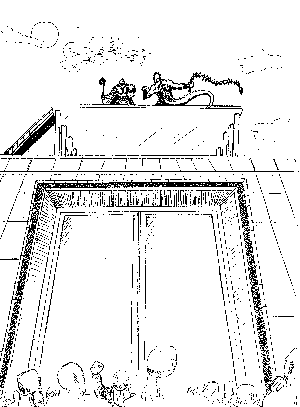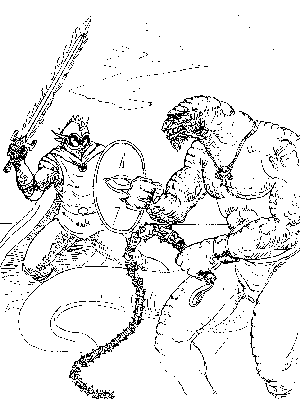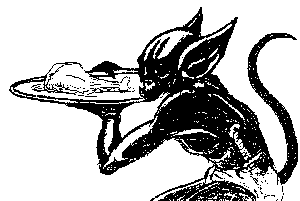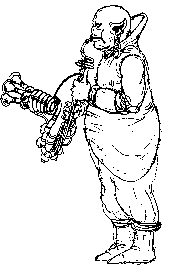Volume 1 Issue 3 Talislanta's Magazine Jan/Feb 1995

Volume 1 Issue 3 Talislanta's Magazine Jan/Feb 1995
Inside This Issue
I'd just like to say hello to all the Talislanta players. Let me say up front that I'm not a rules hacker; as the creator of Talislanta my main interest has always been the milieu, the mood or "feel" of the setting and inhabitants, and the visual elements. I'd be most interested in hearing what players and GMs like and don't like about the game - as we begin to gear-up for a 4th edition, your suggestions would be most welcome.
Talislanta was first conceived not as a role playing game but as a world setting. From its inception, the most important part of the milieu has always been the visual elements. While writing the first draft of The Chronicles I created over three hundred design sketches of Talislantan races, creatures, costumes, weapons, and conveyances. These rough sketches (some of which appear in this issue) were sent to P.D. Breeding-Black, who turned them into the works of art that graced the pages of the first Talislanta books.
Stephen Michael Sechi


The Clash of Champions
This illustration was the original design sketch for the cover of the
first edition Talislantan (sic) Handbook. PD Breeding-Black produced the
final version in pencils. We produced a duotone of that drawing for the
cover of Tal 1, and published the pencil version in the Chronicles. A
few years later PD produced a painting of this illustration which we
used as a cover for one of the Cyclopedias.
SMS

Greetings to all those of good taste! After a long, yet somewhat satisfying, romp through the restaurants, taverns, eateries, and inns of the always enchanting city of Cymril two words come to my mind: fair and awful.
Now, you say "Alnmar, my good friend, you never think that any place is truly good". Ok. I admit that my tastes are far too refined for most establishments, but keep in mind that there was that lovely place in Carantheum that I visited a few years back. But, I digress.
Over-all I found the dining establishments of Cymril to be fair (with a few choice exceptions). I must say, though, that I think that many of the city's cooks should cut back on their use of leeks. By the end of my third day in the city, I was ready to strangle the next server to bring me a leek ladened meal. Now, I like leeks as much as anyone, but there is a limit to how much a person can stand of any single item, and Cymrils restaurants exhausted my enjoyment level of leeks pretty quickly.
Ok. Now that I have that out of my system, on with the critiques:
Thus, if you are a leek lover, you will probably find no finer food in all the world. However, if you are not in the mood for a leek overload, you will probably want to move on.
Upon entering, a lovely, older lady led me into a private dining room covered with soft cushions and containing a short table. There, she asked me to sit and brought in a long line of beautiful serving girls, telling me to choose one. Then, as I ate, the girl I had chosen rubbed my feet and massaged my back.
All and all, it was quite pricey for the average, if not poor, food. And, while I appreciated her concern, it became a bit annoying how often my server suggested that I should retire to a bed upstairs. Still, I have never left a restaurant more relaxed.
At best, most civilized folk find scavenging for food of any kind to be an unclean and unpleasant practice. When carrion is the food of choice, the scavenger is often regarded as grotesque, horrible, a carrier of disease and death.
It is the fate of the Stryx and others of their ilk to carry upon their persons the lingering stench of their last meal, which clings to their garments, claws, and feathers, and cannot be easily disguised. The same is true of Stryx cave dwellings, which reek from the rotten flesh that is stored and eaten within. The very sight of carrion is often sufficient to make non-scavengers nauseous; the scent of decomposing carrion, buzzing with flies and hanging off the bone, is virtually guaranteed to do so.
Conversely, the Stryx regard rotting carrion as the choicest food, not unlike the way non-scavengers favor a well-aged cheese or bottle of wine. To the Stryx, the odor of carrion is as appetizing as the scent of a home-cooked meal is to others. The sound of buzzing flies is like music to their senses; the pale forms of writhing maggots are like a delectible garnish to the main course. Given such differences, it is not surprising that the Stryx do not get on well with other folk, who tend to regard them as ghouls.
©1994 Stephen Michael Sechi

Greetings, and welcome to the first of a new series, Entrancing Events.
"What's going on in Cymril?" "Where will the best traveling entertainers be?" "Who's having the best parties?"
Entrancing Events will be a (semi-) regular feature within these pages which will attempt to answer these and other similar questions.
After some deliberations, my good friend, "Palthor the Ever Entertaining" of Cymril, has agreed to take some time out of his very busy social calendar to author this feature. Truly, there could be no better choice. For the past three years, Palthor has been the most renowned host of social events in all of The Seven Kingdoms. Everyone in Cymril knows that if you want to know what's going on (and you can find him at home), you talk to Palthor. So, it is with much oohing and aahing that this humble scribe most thankfully accepts the famous entertainer's help in writing this article.
In the meantime, Jai Kel "Sage of the Great Southern Wasteland" has asked me to briefly explain how this feature will be useful to you, his readership. Well, this is somewhat dependant on what role you play within your company's travels of Talislanta. If you are simply one of the company, you may see something which interests you. In this case, you might wish to bring the item of interest before your company's administrator, often referred to with love and admiration, as the grand and glorious GM. Being kind and generous souls, most GMs will see your desire to attend the wondrous event and therefore lead you there. If, on the other hand, you are the company’s omnipotent GM, you may find some event which you might devilishly twist and then inflict upon the rest of your company.
It is important to note, at this point, that while the majority of this feature will be authored by Palthor "the Ever Entertaining", I will be inserting information useful to GMs as follows: "...regarding Tarra [Danuvian Swordswoman; 1st Level; SPD +2; CR +4; Hit Points 15], she is...". Of course, those GMs out there who have others of their company who read this feature may wish to change, alter, transform, or otherwise hack this information. Please feel free (in all cases this information is only close to the truth anyway).
Well, that about does it for this introductory installment. But, before I say farewell, Palthor wanted me to give you his "Three Rules of Entertaining":
"Far in the distance I heard the fierce shrieking howls of an Ahazu band on the warpath. There was little time to take defensive action. We herded the mounts into a grove of parasol trees and took cover behind a stand of thornwood. A moment later the Ahazu war party came into view, running towards us through the dense undergrowth. Now I understood the reason for the Ahazu's striated skin: it helps them blend into the jungle shadows, and makes them difficult to see clearly.
We fired our crossbows as the first line of warriors came into range. The Ahazu took several casualties, but kept on coming. The magician, Balmundos, prepared to send a spell of fire into their midst. The Ahazu unleashed a hail of three-bladed throwing knives. That was the end of Balmundos.
Another second and the Ahazu were upon us, leaping and scrambling over the thornwood barricade. Now the fight began in earnest. The four-armed warriors reveled in this type of close combat, where they enjoy a decided advantage. I countered with wide strokes of my greatsword, using the long blade to keep the attackers at arm's length; an excellent strategy, but an inadequate response. The Ahazu were too many. They overran our position, until at last I was the only one of my group still standing. Surrounded and outnumbered, I could devise no tactical response but to fight until the end.
Suddenly one of the Ahazu let out a blood-curdling scream. Frothing at the mouth, the creature set upon his own companions like one possessed, wielding a three-bladed knife in each of its four hands. From the other Ahazu I heard the cry, "Shan-Ya!", repeated several times. While they were occupied with the mad one I made a strategic withdrawal into the jungle."
c. Stephen Michael Sechi
The guys find themselves at the Farad's estate (big, big place.. this Farad is one of the key players that "borrowed" the windship arcanology from the Phantasians / Cymrilians and "loaned" it to the Rajans). They are escorted into a massive hall that is prepared for a feast of some kind. There is an awful lot of seafood on those tables... and what's that smell? roasted land dragon? who eats dragon? Wait a minute...
I really wish you all could have seen the looks on their faces when they put 2 and 2 together. It was a priceless moment. And it was far too late. They were promptly surrounded by a zillion bowmen and ordered to drop their weapons. Just as several fat Imrians entered and took their places at the table, to watch the slow, painful death of the group (revenge for what happened to their countrymen). The Kang entered as well (the middle aged one and his two young bodyguards / aides). In my mind, the Kang were somewhat glad to see a group of honorless thieves die. Also, they were cutting a major deal with the host, so they were content to watch. Who cares about foreigners, anyway?
This was the crucial moment. Everything stemmed from the events of the next minute. Ready?
When Abdul saw the Imrians, he snapped (he had been a slave in childhood to some Imrians). The rest of the party put down their weapons and were preparing their groans of "great..." and "not again". Everything was going according to plan. This capture was going to get the adventure back on track... or so I thought. Abdul looks at the Imrians and says "I will drink your blood and eat your hearts." The Imrians chuckle and then everything goes straight to hell.
You see, Abdul has these little "acorn" type things. He got them many adventures ago in the Aberrant Forest. So long ago, I'd forgotten he had them. They were from a peculiar kind of tree that would fade in and out of existance (the ghost willow). When crushed in the palm, they would make you fade into a noncorporeal, "ghost" form (along with anything you were carrying) for a random amount of time. Not terribly useful (the random time thing could be a killer). Or so I thought.
Abdul reaches into his cloak to get an acorn and the bowmen react like they're supposed to... they shoot him. The rest of the party is just looking at Patrick like, you are one dead Arimite. And he almost was. Two things saved him. None of the bowmen got a critical hit, and the last one rolled a 5 for damage instead of a 6. Abdul had 1 hit point left. The effect was, he got peppered with arrows, but none in a vital organ (normally I would have dropped him from shock, but killing Imrians was Abdul's life-long quest... he struggled on somehow). The party almost cheered. Abdul drew his knives, crushed the acorn, and stumbled past / through the dismayed archers. He charged the banquet table shrieking at the top of his lungs (screaming ghost bristling with arrows... scary) and his acorn wore off. Thinking to protect the warlord, one of the Kang bodyguards (the youngest most foolish one, it turned out) jumped in front of Abdul. Abdul was almost berzerk at this point, and he attacked the Kang with a frenzy, in order to get past him and at the Imrians (who had stopped chuckling and were running for their little fish-lives).
Now, here's a very important part (and why I like dice systems, they lead to funky stories). Abdul and the Kang have equal combat ratings (both 10 if I recall right) so it's pretty much up to the dice who wins this (barring great tactics). All I have to do is hit and Abdul goes down. Six or higher on d20. No problem. The other players are beginning their "nice try, Abdul" speeches.
Patrick rolls and gets a 20! First thing. Just like that, he criticals the Kang with a viscious knife cut to his abdomen. The Kang makes his CON roll and stays up. Now he's mad. He lunges with his falchion and... a three. I rolled a 3. Whoosh... a clean miss. Patrick says Abdul ducks under the sword (I'm expecting him to run) and cuts the Kang again, this time on his sword arm. We all look at Pat like he's crazy. He looks back like, yes, he is crazy. He rolls. Guess what? Yep. Another 20. Slash! the Kang's arm is cut to the bone. The Kang makes his CON roll with a partial success, so he stays conscious, but drops his weapon. The Kang goes to his knees clutching his ruined arm and Abdul (and Pat for that matter) laugh at him as he runs after the Imrians. The other characters (and their players) stare open-mouthed at the Arimite-Who-Could-Not-Die. It was one of those moments.
The Imrians were already out of sight, however, and the Farad had regained his senses enough to order his bowmen to shoot the other characters if Abdul didn't stop and lay down his weapons. The tension in the air was very thick as Pat debated what to do. Abdul wanted those Imrians more than anything. We all knew it. We all knew that Abdul would go after them, and damn the consequences. The other players expected to die. And that's the moment that changed Abdul forever, and changed the campaign beyond all recognition. Abdul turned around and said to the assembly:
For the third time in as many minutes, we all looked at Pat with open-mouthed wonder. He was the bravest thing we had ever seen. And that's when I decided. The Farad turned and was prepared to give an order when the older Kang stood from his place at the table. His commanding presence captured everyone's attention. He spoke in thickly accented Talislan:
Everyone stopped.
He sat back down. The Farad looked meekly at his bowmen, then gestured curtly. They returned to their guard positions. The other characters rushed over to Abdul as he collapsed on the intricate mosaic floor.
============================
Okay, some comments... I love that session. Several great things happened during it. This is to help define those events.
Next... The Far Seas... and Flyn in action...